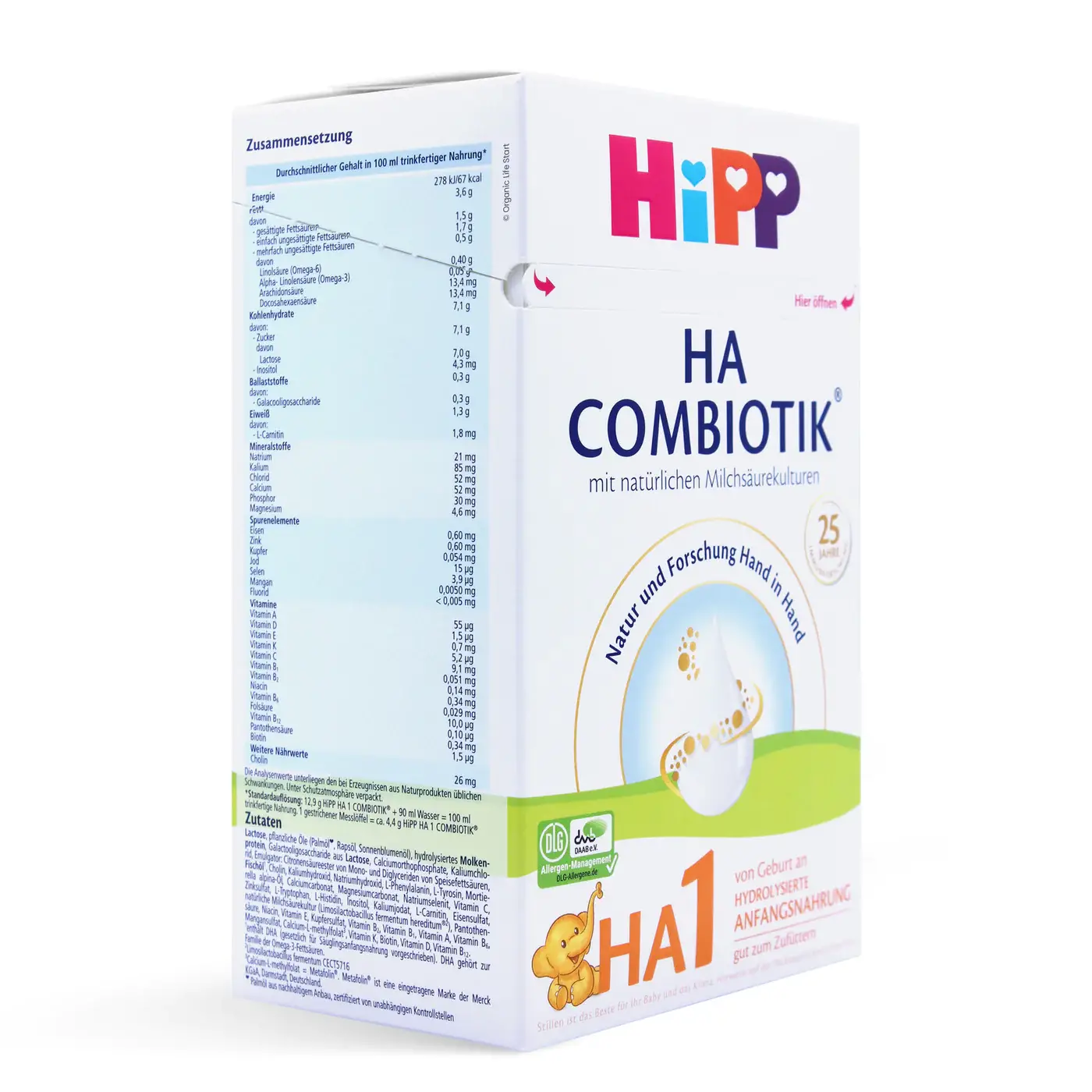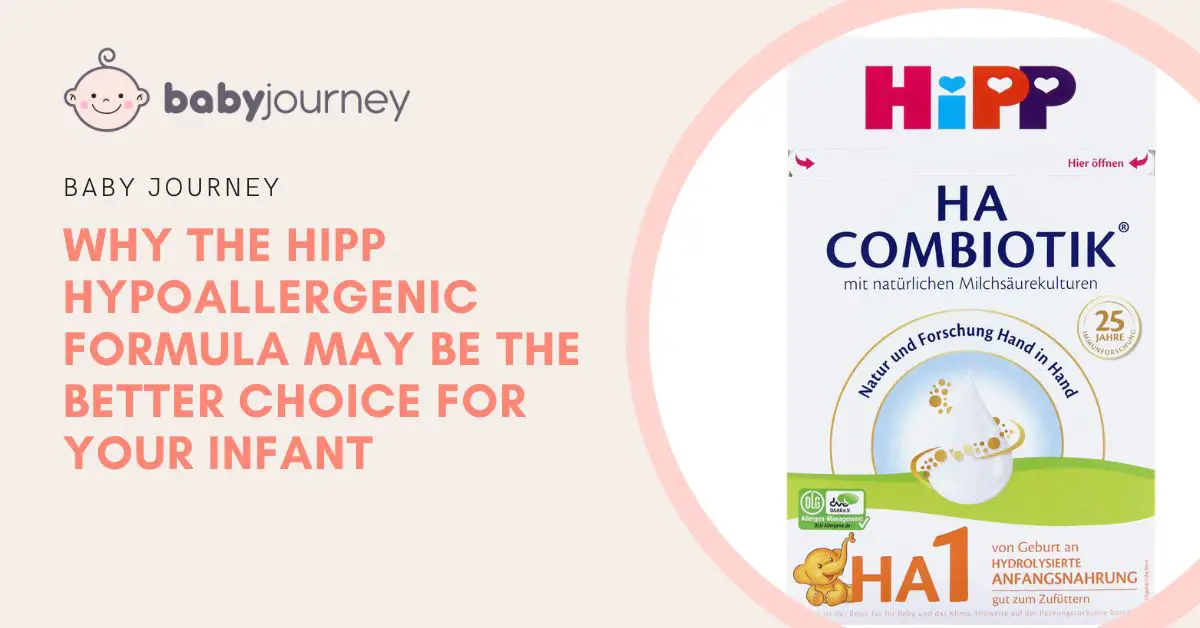Being a parent can be overwhelming and understandably so. As a new parent, you’re responsible for making choices for the one person you love the most – your precious baby. That’s a lot of responsibility!
One of the most complex choices and certainly one of the most important decisions you’ll make is deciding which baby formula best fits your infant.
In this article, we’ll discuss why the HiPP hypoallergenic formula might be a better choice than others to help make your parenting journey easier.
What is HiPP Hypoallergenic Formula?

As a new parent, familiarising yourself with all the variants and types of baby formulas can be a little challenging. So, let’s start with the basics.
HiPP HA is a symbiotic formula manufactured by HiPP and verified by the responsible regulatory body. Like the other symbiotic variants of HiPP, the HA formula is also classified into stages synchronized with the child’s age group. HiPP HA is suitable for babies from 0 months to 6 months for both HiPP HA Stage PRE and Stage 1. HiPP HA Stage 2 is suitable for babies who are 6 months to 12 months of age.
Unlike the usual American baby formulas, European formulas including HiPP HA, have specific stages that are formulated for the nutritional needs per babies’ age.
It also includes a variant option for parents: a with starch and no starch version for babies who are 0-6 months of age. Parents can choose to provide their babies between a gentle version and a more filling and creamier version.
The only main and most significant difference is that HiPP HA is partially hydrolyzed of 86-87%. The proteins it prepares are broken down into small pieces known as peptides. With smaller proteins, babies who have milk protein allergies and milk protein sensitivities find it easier to digest. It does not contain casein. The whey-to-casein ratio is 100:0, making it one of the friendliest baby formulas for a baby’s stomach.
Also read: Best Hypoallergenic Formula
Reasons Why HiPP HA May Be Suitable
#1 Reduced Risk of Allergies
As the name already suggests, HiPP HA dramatically minimizes the risk of a child experiencing allergic reactions due to its structure. To reduce the risk of allergic reactions, does not contain casein, the protein that normally contains allergens. Combined with partially hydrolyzed proteins of about 86-87%, babies find it easier to digest HiPP HA.
These reactions may otherwise be expected in infants because of an underdeveloped digestive system and increased sensitivity toward milk proteins.
The process through which HiPP HA is prepared completely removes any complex milk protein, making the baby formula a safe alternative.
Also read: Best Formula That Taste Like Breast Milk
#2 Scientifically Tried & Tested
To fulfill the claim of only delivering top-notch quality products, HiPP has repeatedly run the HA baby formula through test and test again.
HiPP is regulated by the strict guidelines of the European Union. It takes countless research, testing, and quality assurance to secure the approval of the EU.
And the HiPP formula has emerged successfully each time for the past 25 years.
So you can rest assured that the product is safe.
#3 Organic Ingredients & Lactose Based
The ultimate milestone for all baby formulas is identical to mother feed, and HiPP’s baby formulas rank the closest to it. The HiPP Formula contains natural probiotic lactic acid cultures extracted only from real breast milk. It does not contain any external ingredients that would stun or slow your child’s growth.
Although HiPP HA is not labeled organic, HiPP HA contains organic ingredients. The only reason why this is not organic certified is because it underwent hydrolysis. A product can only be considered organic if it contains organic ingredients and it does not undergo manipulation of form.
#4 Friendly For Infants with Frequent Digestive Issues
A stomach ache or gassing can put a grown-up, let alone an infant, to bed. While a child may be unable to vocalize his symptoms, the discomfort will be evident from his behavior. So if you notice any such signs, you know what to turn to!
HiPP HA (all stages) is highly suitable for children who often experience gas, bloating, and other digestive issues. It is also known to reduce symptoms of colic over time.
It is extremely important to give babies the right formula for their digestive requirements. There is no one size fits all milk that caters to all babies. It is the parent’s responsibility to seek the guidance of a healthcare professional. Your baby’s pediatrician can provide you with the best guidance in this area.
Note: Some children have cow milk protein allergy (CMPA); if that is the case with your infant, we discourage using HiPP HA. It may be responsible for worsening the symptoms. Therefore, it is vital to look for signs of CMPA before you make a dietary change in the child’s meals.
Conclusion
To summarize, choosing a hypoallergenic formula for your infant may be the better choice for several reasons.
Firstly, it may reduce the risk of allergies in infants, especially if there is a family history of allergies or if the infant is at high risk of developing allergies.
Secondly, hypoallergenic formulas have been scientifically tried and tested, and are recommended by healthcare professionals for infants with allergies or other digestive issues.
Thirdly, hypoallergenic formulas are made with organic ingredients and are lactose-based, making them a healthier choice for your infant.
Lastly, hypoallergenic formulas are friendly for infants with frequent digestive issues, such as colic or reflux, and can help alleviate symptoms and improve overall health.
Overall, choosing a hypoallergenic formula for your infant can provide numerous benefits and help ensure their optimal health and well-being.

 PARENTING TIPS
PARENTING TIPS PREGNANCY
PREGNANCY BABY CARE
BABY CARE TODDLERS
TODDLERS TEENS
TEENS HEALTH CARE
HEALTH CARE ACTIVITIES & CRAFTS
ACTIVITIES & CRAFTS


